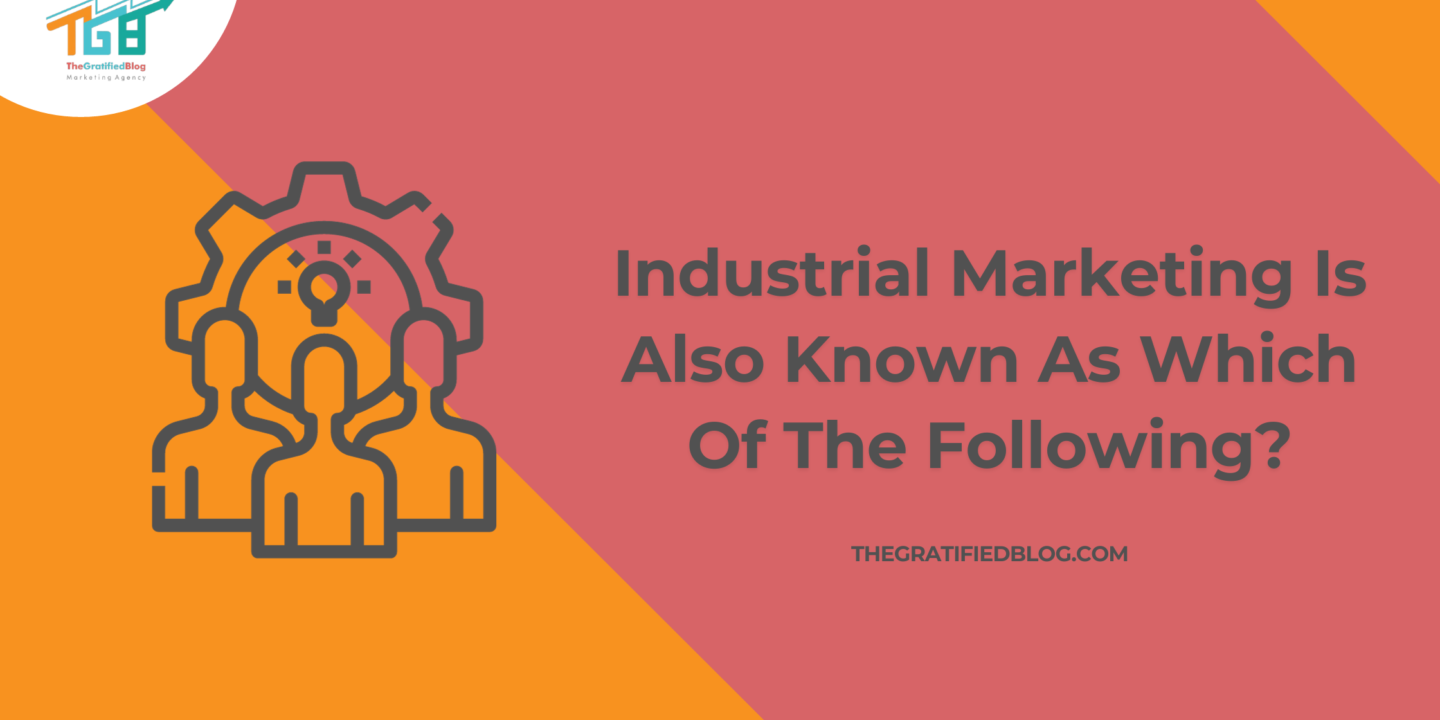
Industrial marketing is also known as Which of the following?” This question is the gateway to a fascinating world where commerce, trade, and business-to-business (B2B) interactions converge. The answer to this query lies at the heart of a crucial facet of the global economy: industrial marketing.
In this blog, we won’t just provide a direct answer to the question; we’ll also embark on an insightful exploration of the world of industrial marketing. We’ll delve into why industrial marketing is often referred to as B2B marketing, unravel the complexities of this field, and uncover the associated challenges and opportunities. Additionally, we’ll address frequently asked questions to understand the topic comprehensively. Finally, we’ll conclude with a summary and key takeaways.
So, let’s embark on this journey to uncover the world of industrial marketing, But first, let’s answer the question.
Industrial Marketing Is Also Known As Which Of The Following?
- Consumer Marketing
- B2B marketing
- Digital Marketing
- Social media marketing
Answer: B2B Marketing
Now that we’ve established that industrial marketing is synonymous with B2B marketing let’s take a more in-depth look to understand this concept better.
Understanding Industrial Marketing
Industrial marketing involves a unique set of strategies and practices compared to consumer marketing (business-to-consumer or B2C). While B2C marketing focuses on selling products and services directly to individual consumers, B2B or industrial marketing concentrates on selling products and services to other businesses. In other words, it’s businesses selling to other businesses.
For example, a company manufacturing specialized machinery for the food processing industry is engaged in industrial marketing. Their target customers are not individual consumers but other companies involved in food processing.
These customers purchase the machinery for their business operations, and this is where B2B marketing comes into play.
Why Is Industrial Marketing Also Known As B2B Marketing?
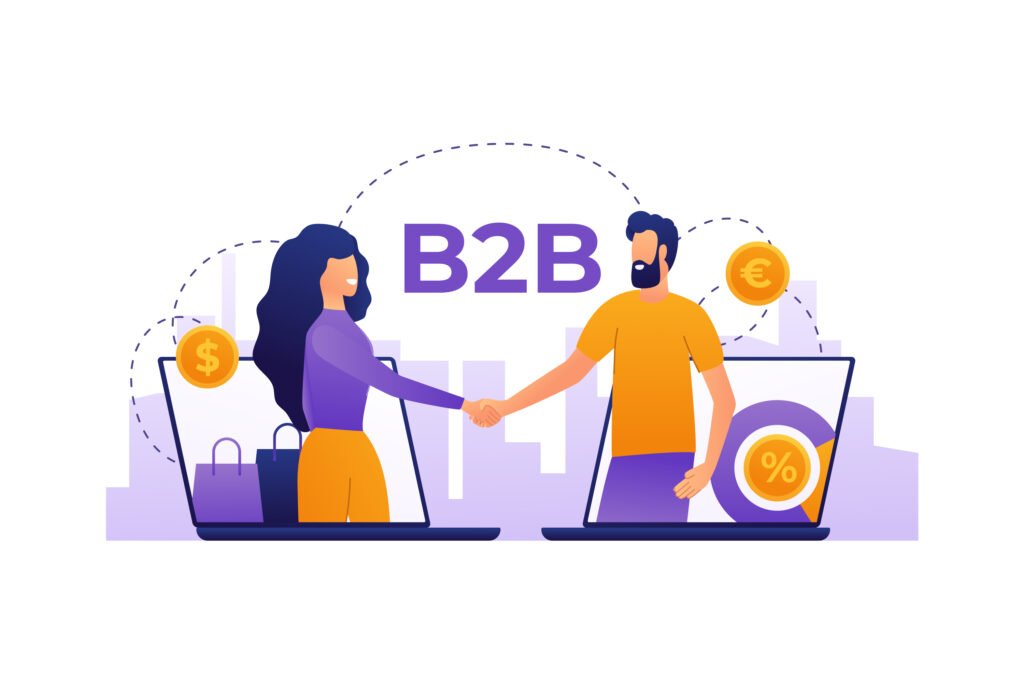
Industrial marketing is often referred to as B2B (business-to-business) marketing for several key reasons:
Target Audience
In industrial marketing, the main groups we’re reaching are businesses and organizations, not individual shoppers. This is a significant distinction from B2C marketing, which is all about getting the attention of individual buyers. It’s like two different worlds, one dealing with business-to-business interactions and the other focusing on selling products to everyday people.
Products And Services Complexity
B2B marketing often deals with products and services that could be more straightforward; they are complex, highly specialized, and designed to fit precisely what businesses need. Due to this intricacy, a different marketing approach is required, focusing on these offerings’ technical and practical aspects.
Relationship-Centric Approach
Establishing solid and long-lasting business relationships is at the core of B2B marketing. Trust, reliability, and continued partnerships are crucial in industrial marketing. That stands in sharp contrast to B2C marketing, where transactions are typically one-time purchases without the same emphasis on building enduring connections.
Longer Sales Cycles And Multiple Decision-Makers
B2B marketing usually takes more time to complete a sale because many people in a business need to agree. You have to persuade all these people, which can be complicated. It’s like solving a puzzle with many pieces, and this puzzle is an essential part of B2B marketing.
Now that we’ve covered what industrial marketing is and why it’s often referred to as B2B marketing, let’s dive into the difficulties and advantages that come with it.
The Challenges And Opportunities Of Industrial Marketing (B2B Marketing)

While B2B marketing shares some commonalities with B2C marketing, it presents unique challenges and opportunities that require a distinct approach. Let’s explore some of these challenges and opportunities:
Challenges
- Longer Sales Cycles: B2B sales cycles are typically longer due to the complexity of business decision-making processes. Marketers need to have patience and persistence to navigate these extended timelines.
- Multiple Stakeholders: B2B transactions often involve multiple stakeholders within the purchasing organization. Convincing and aligning the interests of these stakeholders can be challenging.
- Customization: B2B customers often require customized solutions to meet their specific needs. Marketers must be prepared to tailor their offerings and communicate how these customizations add value.
- Intense Competition: B2B markets can be highly competitive, with multiple suppliers vying for the same customers. Marketers need to differentiate their offerings effectively.
- Regulatory and Compliance Considerations: B2B marketing may involve Adherence to industry regulations and standards, which may vary according to the specific industry. Marketers must be well-versed in these requirements.
Opportunities
- Loyalty and Repeat Business: Successfully building relationships in B2B marketing can lead to long-term, repeat business. Contented customers tend to prolong their collaborations with dependable suppliers.
- Higher Transaction Values: B2B transactions often involve larger order values, contributing to increased revenue opportunities for companies engaged in industrial marketing.
- Innovation and Problem-Solving: B2B marketers often play a role in problem-solving and innovation. They collaborate closely with clients to tackle particular challenges and develop tailored solutions.
- Industry Expertise: Becoming an expert in a specific industry or niche can be a valuable position in B2B marketing. Marketers who understand the nuances of their target industry can provide valuable insights and solutions.
- Networking and Partnerships: B2B marketing often involves networking and forming strategic partnerships within an industry. These alliances can unlock pathways to fresh prospects and potential advancements.
FAQs
Q1. What is the primary focus of industrial marketing?
A. Industrial marketing primarily focuses on promoting and selling products and services from one business to another (B2B marketing). It involves businesses marketing their offerings to other businesses, institutions, or organizations rather than individual consumers.
Q2. How does industrial marketing differ from consumer marketing (B2C marketing)?
A. The critical difference between industrial marketing (B2B) and consumer marketing (B2C) is the target audience. B2B marketing caters to businesses, while B2C marketing targets individual consumers. Industrial marketing often involves longer sales cycles, customized solutions, and a focus on building solid and long-term relationships.
Q3. What are some effective strategies in industrial marketing?
A. Effective strategies in industrial marketing include building strong industry-specific relationships, providing detailed technical information, participating in trade shows and industry events, leveraging professional networks, and offering customized solutions. Successful industrial marketing often requires in-depth knowledge of the target industry and a consultative approach to address business customers’ specific needs.
Conclusion
In summary, industrial marketing is also known as B2B marketing because it focuses on businesses selling products and services to other businesses. The distinct characteristics of B2B marketing, including a specialized target audience, longer sales cycles, relationship-building, and a focus on volume and value, set it apart from B2C marketing. While industrial marketing presents its unique challenges, it also offers significant opportunities for businesses that can navigate this specialized field effectively. Understanding the nuances of B2B marketing is essential for companies looking to thrive in business-to-business commerce.
If you still have any questions related to the blog, then feel free to leave your questions in the comment section. We will be happy to answer you.
Thanks for reading 🙂





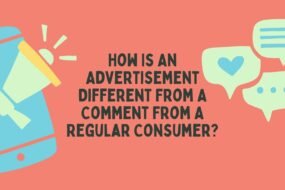
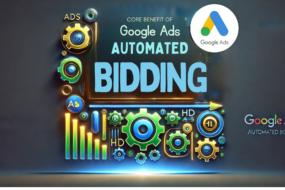
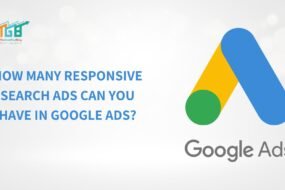
No Comments